The development of technology has been and will continue to open up many opportunities for businesses in various industries, including those in the logistics sector. Logistics is a vast and complex field with many processes requiring high precision and constant optimization. Leveraging technology for custom logistic software development or using available software can help businesses automate and streamline their business processes, thus increasing efficiency.
A survey by Gartner showed that 87% of supply chain professionals plan to invest in making their logistics platforms more flexible. Is your business among this 87%? If so, let’s explore the benefits of logistics mobile app development, the costs, essential features, and the standout future trends in this field.
What is Logistic software development?
Before understanding what logistic software development is, you need first to understand the essence of logistics software. Logistics software is a platform used to automate and manage logistics tasks, from fleet management, warehousing, order processing, inventory control, shipment tracking, and more. Custom software development for logistics is the process of building technology solutions to serve these purposes. Businesses are now turning to solutions to develop logistics software to gain visibility into their processes, manage supply chains more effectively, improve customer experience, and reduce transportation costs.
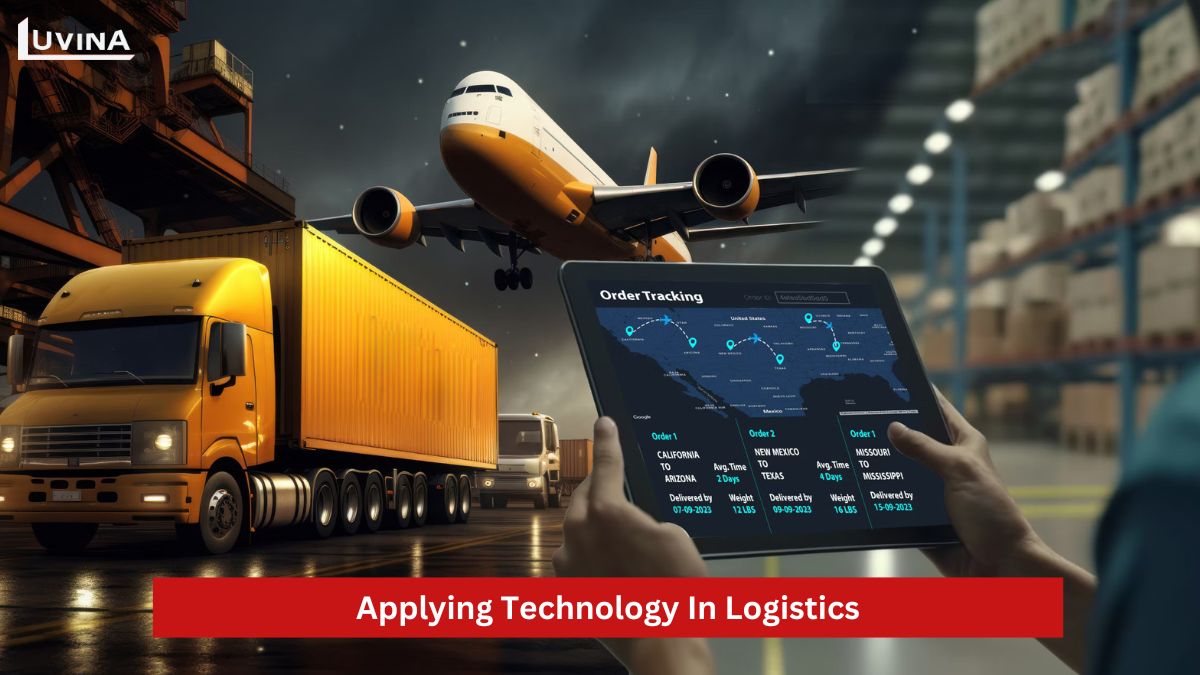
Today, custom logistics software solutions mainly include the development of supply chain applications, warehouse management systems, enterprise resource planning software, tracking tools, transportation management systems, and many other types of solutions.
Benefits of transportation and logistics software development
As mentioned above, every aspect of the logistics management process, including supply chain management, equipment management, delivery, and more, is quite complex and requires high accuracy. Logistic software development can bring several benefits to businesses, helping them increase profitability and productivity:
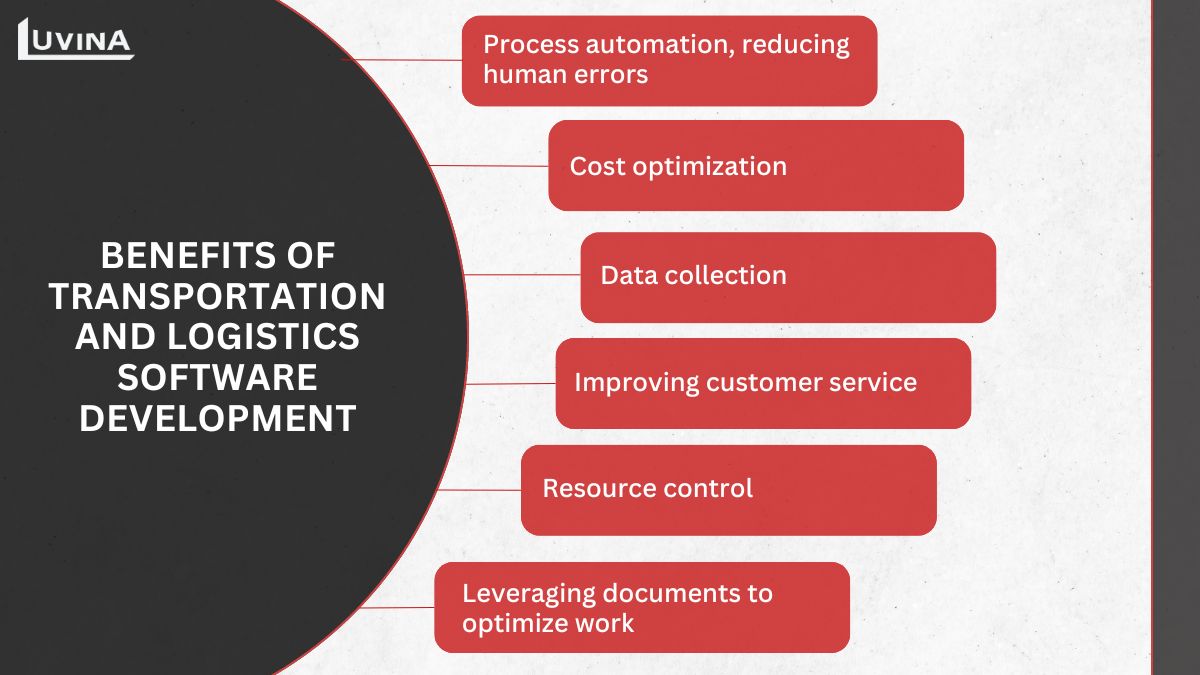
1. Process automation, reducing human errors
Logistics management software development will fully automate business processes. Previously, performing tasks manually often led to many human errors. This is because people can be influenced by emotions, personal issues, and fatigue, especially when overworked, which makes them prone to mistakes. Human workers can lose focus or make errors. Process automation eliminates the possibility of these errors and allows the workforce to focus on more challenging and engaging tasks.
You can manage various processes like shipping, receiving, inventory control, and restocking when implementing logistics software development. All data will be automatically updated and processed within the software.
While humans excel in analytical thinking and problem-solving, machines are better suited for repetitive tasks. This is why logistic software development significantly changes the logistics processes of any company in the field.
2. Cost optimization
Logistics software solutions development can help companies cut costs significantly in various areas. Through precise calculations from logistics software systems, businesses can identify where expenses are higher than necessary, which areas can be more cost-efficient, and where to source cheaper supplies.
For example, logistics software can identify the best routes to save fuel, analyze costs to choose the best suppliers and eliminate human errors. In short, transportation and logistic software development will allow businesses to save substantial costs over time.
3. Data collection
Logistics software development not only eliminates manual data entry but also enables businesses to systematically collect, accumulate, and store data from various sources. This benefit helps eliminate duplication and inconsistencies, while also assisting businesses in analyzing the collected data to make better decisions. Of course, the company’s system still needs specific features and configurations to gather the necessary data, but having a logistics platform in place makes data collection and storage much easier and faster.
4. Improving customer service
By developing logistics software, businesses open up new opportunities and provide better service quality to their customers. With logistics software, businesses can not only handle deliveries more efficiently but also speed up the order fulfillment process for customers. Additionally, customers can track the delivery status directly through the app instead of being restricted to certain times. This tracking feature enhances the transparency of the shipping process and helps build trust between logistics businesses and their customers.
5. Resource Control
When deploying logistic software development, businesses can manage and control their resources effectively. For example, through specialized applications, logistics companies can track the use of transportation for deliveries or assess the suitability of transportation options.
6. Leveraging documents to optimize work
With logistics and transportation software development, businesses can upload all existing company documents into the system. This means you won’t need to waste more paper for contracts and forms. Instead, everything can be done digitally. Furthermore, by storing everything in a centralized system, searching for necessary documents becomes much easier.
7 Key Features of Logistics Software
Each logistics software is different, especially when businesses want custom logistic software development to fit their specific needs. However, the software they require will generally need to include the following key features.
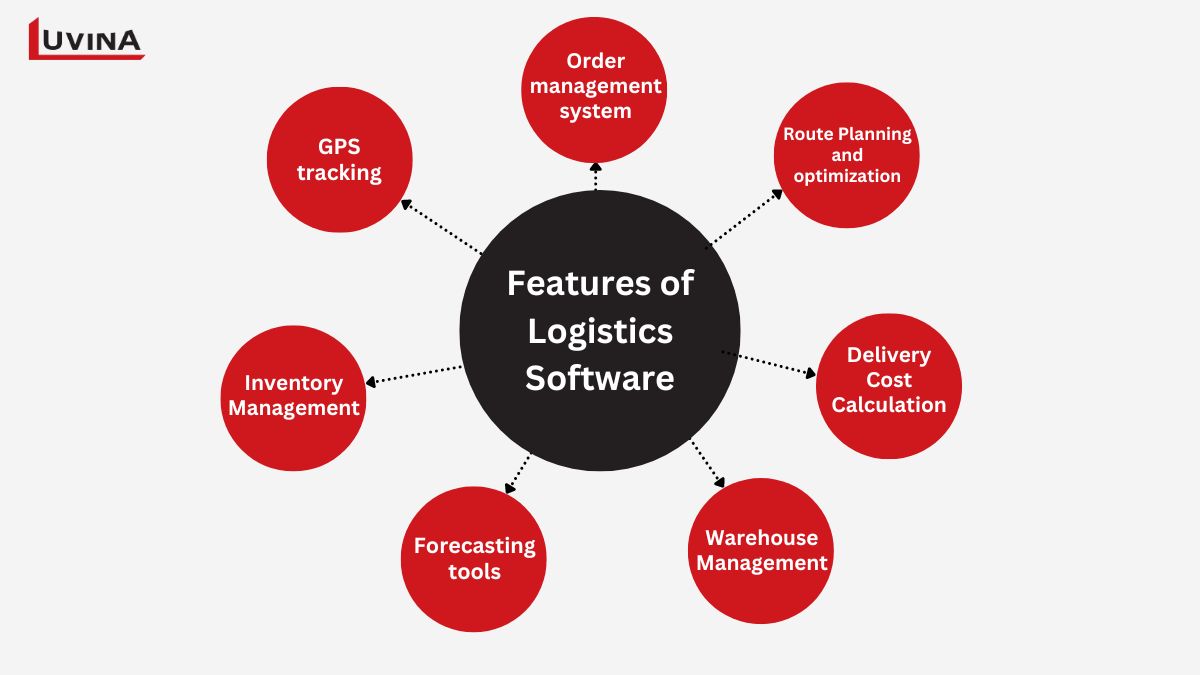
1. GPS tracking
GPS tracking in logistic software development is essential for both businesses and customers to monitor the transportation of goods in real-time. For customers, they can keep track of their shipments—knowing where their goods are and when they will arrive.
For logistics companies, real-time tracking helps monitor the movement of each shipment from the point of dispatch to the final destination. This tracking data is invaluable for optimizing routes, improving customer service, and maintaining vehicles. For example, companies can use tracking information to change routes and speed up deliveries proactively.
2. Order management system
Logistic software development means you’ll have an additional tool for managing orders. The logistics software provides a comprehensive system to create, update, and manage each order, making the process more efficient and organized. The order management feature of logistics software acts as a coordinator, reducing the need for manual coordination.
Some features that help simplify the order management process for many companies include automatic scheduling, order status management, automatic invoice generation, and integration with multiple payment gateways.
3. Inventory Management
The inventory management feature in logistics applications can help businesses monitor supply levels, optimize stock, and restock inventory in a timely manner. With this feature, companies can continuously track the available quantity of goods and ensure enough stock to meet demand over a given period.
Many companies are now implementing logistic software development combined with barcodes, QR codes, or RFID systems to track damaged, lost items, and returned goods from the warehouse. These tools enhance warehouse and logistics management, reducing costs by cutting down on labor and minimizing human errors.
>> Read more: Inventory Management Development
4. Forecasting tools
Logistics mobile app development can fully support businesses in predicting the market and customer demand using machine learning algorithms. The software carefully collects and analyzes data to provide businesses with key insights into their customers. Based on this information, businesses can gain a critical understanding of customer behavior and forecast future customer interactions.
The forecasting feature of logistics software plays a crucial role in enhancing the shopping experience for customers. These predictions can be used for upselling and boosting customer retention by providing a personalized shopping experience.
5. Route Planning and optimization
One of the biggest problems drivers often face in logistics operations is inefficiency due to poor routing. Some drivers, especially new ones, often have to backtrack and find alternative routes, leading to excessive fuel consumption and delayed deliveries.
When deploying logistic software development, adding a route planning and optimization feature helps businesses identify the fastest and most efficient routes for deliveries. The software will display all available transport routes, allowing businesses to choose the most convenient one for the company or their customers.
6. Delivery Cost Calculation
Another essential feature in logistics software development is delivery cost calculation. This feature helps businesses quickly and easily calculate the cost of shipping goods. Comprehensive cost analysis allows businesses to determine the exact rates needed to stay operational while maintaining competitive fees. This feature saves businesses a lot of time and ensures precise calculations without errors.
7. Warehouse Management
In the logistics field, warehouse management involves many standards and processes, with a variety of operations including storage, handling, returns, shipping, and more. Logistic software development with strong warehouse management features helps businesses control inventory, optimize storage, and increase capacity. This feature is extremely useful for businesses to enhance operational efficiency, speed up deliveries, and reduce transportation costs as well as manpower.
Technologies Trends Used in Logistics Software Development
Logistic software development is expected to boom in the future with the integration of modern technologies. Among them, the following four technology trends are predicted to be key to the future of logistics.
1. IoT (Internet of Things)
68% of supply chain and logistics leaders have expressed their willingness to adopt IoT technology. The connectivity of IoT not only helps reduce costs but also improves transportation processes and reduces lost goods. It enhances operational efficiency and security. One of the most popular applications of IoT in logistic software development is the use of sensors. By attaching sensors, tags, and tracking devices to shipments or containers, logistics companies can monitor goods in real-time, gaining accurate and constantly updated information about the location and status of products. This IoT application helps identify potential issues while improving coordination in the supply chain and optimizing inventory levels.
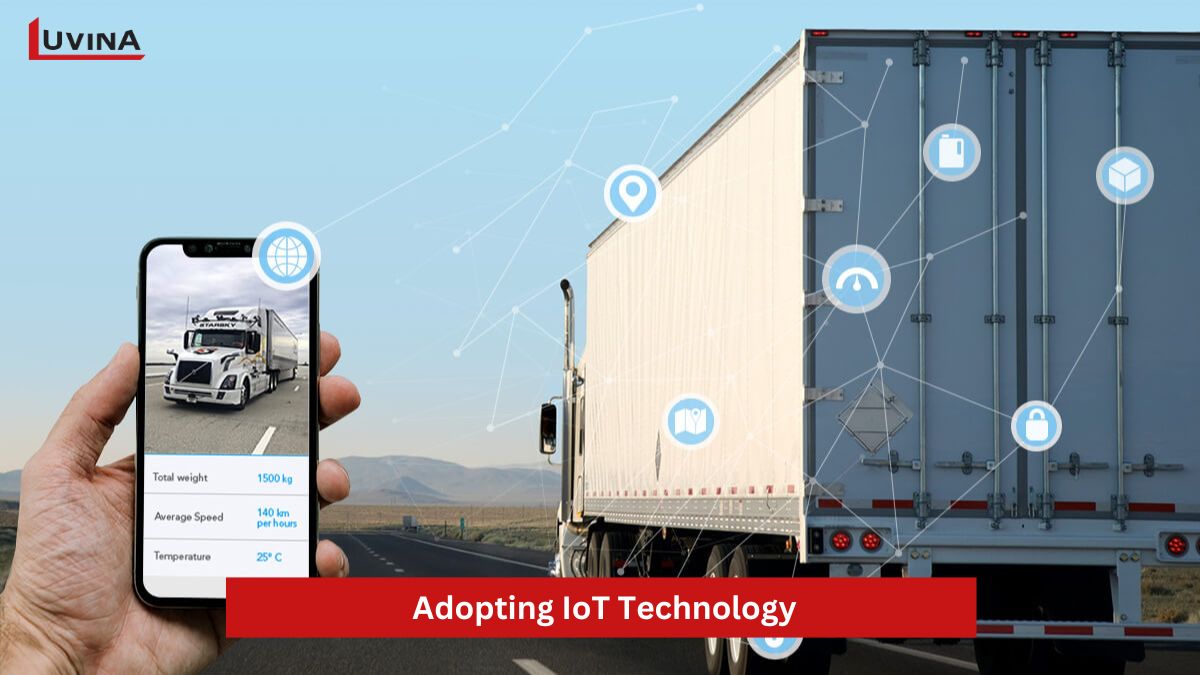
IoT sensors also provide the supply chain with self-monitoring and self-maintenance capabilities. Smart sensors alert companies about restocking needs, and help with order picking and packaging. Many companies are already using IoT sensors in management processes; for example, Volvo uses them to track shipments, and Nissan utilizes them to manage its warehouse system in the UK.
>> See more: The Power of IoT in Logistics and Supply Chain
2. RPA (Robotic Process Automation)
RPA (Robotic Process Automation) tops the list of technology trends in logistics software development. A report from Inbound Logistics shows that 4 out of 5 warehouses worldwide are still manually operated, meaning there is huge potential for automation in logistics. According to MHI’s 2023 report, RPA will continue to lead innovations, offering competitive advantages by automating processes for logistics companies.
Currently, automation software is used alongside manual labor, gradually taking over repetitive tasks and supporting the workforce during peak times. In the future, automation software will become more advanced, excelling in tasks like picking, packing, sorting, and even delivering with partial or full automation.
Many logistics companies have started integrating RPA into their processes to streamline warehouse operations and minimize human error. These technologies allow logistics staff to focus on strategic tasks while reducing safety risks in hazardous environments.
Major logistics companies are not missing out on the RPA trend. For instance, DHL has invested $15 million to automate warehouses in North America through a partnership with Boston Dynamics.
3. AI & ML
AI and machine learning will bring significant changes to custom logistic software development. Businesses that have quickly embraced AI in logistics have seen notable improvements, such as a 15% reduction in logistics costs, a 65% increase in service levels, and a 35% optimization of inventory. From handling office tasks to enhancing human skills, AI and machine learning will streamline logistics processes to a remarkable degree.
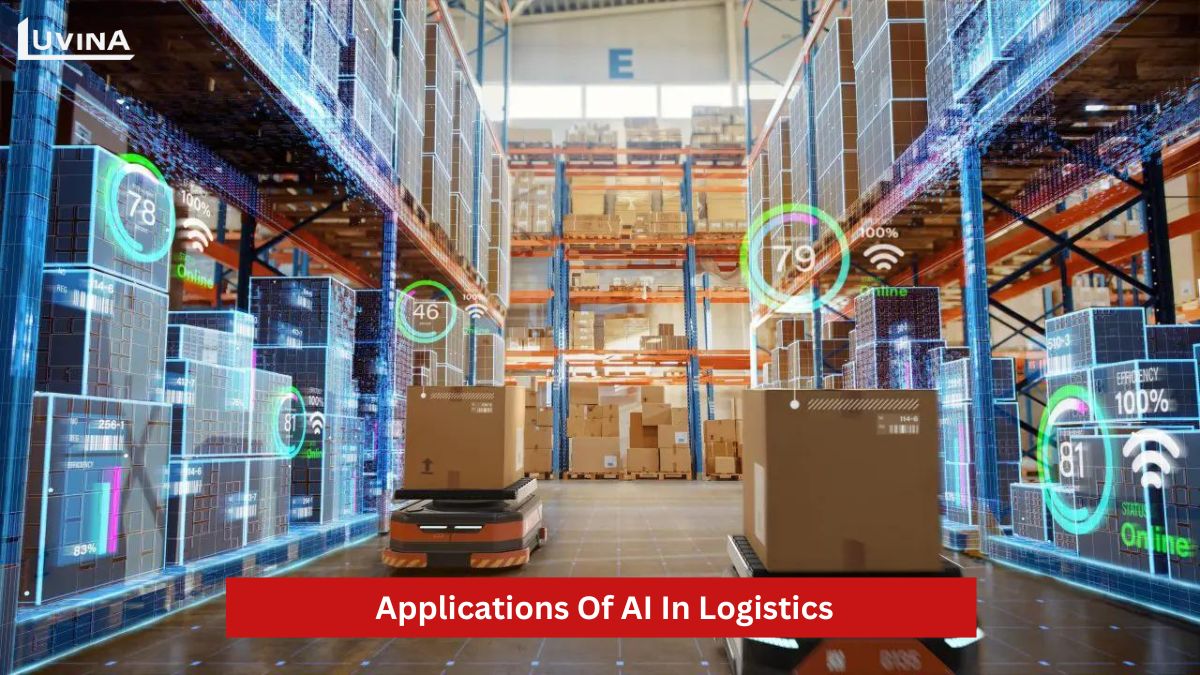
With the help of AI and machine learning, logistics businesses can make smarter decisions to improve operational efficiency. In warehouses, AI-driven automation can be used as a predictive tool to anticipate demand fluctuations, preventing stock shortages or excess inventory. Additionally, AI and machine learning can enhance mechanical processes through robotics and computer vision, as well as improve customer experiences via chatbots. AI’s demand forecasting feature can also optimize marketing and retail strategies.
4. Cloud
With half of logistics service providers already using cloud-based services and 70% of companies stating that they will adopt cloud computing in the future (according to a study by Logistik Heute), the cloud is set to be a major trend in logistics management software development. Offering flexibility and real-time access to intelligent software and critical data, cloud services enable logistics businesses to scale their operations and business models as needed, paying only for what they use. By leveraging the cloud, logistics companies can deliver faster and more efficiently.
To fully benefit from the cloud in logistic software development, IoT will also play a vital role. IoT software will collect data from various sensors and store it in the cloud. This data will then be used for machine learning and AI analysis to improve supply chain efficiency and inventory management. Additionally, cloud-based software can help logistics businesses automate processes, reduce paperwork and manual errors, and improve customer service. While data migration and security in the cloud can raise some concerns, the cost and time savings make cloud logistics an increasingly attractive trend.
Cost of developing logistics software
Understanding the cost and estimated time it takes to develop logistics software is important in the very first step to building such logistics software with minimum unnecessary cost.
It’s quite difficult to give an exact figure in the case of logistic software development because the cost significantly depends on the business strategy, the number and complexity of features a company wants to get, the type of deployment, the technology stack, and also the geographical location of the IT partner. For example, developers from Western Europe and the US charge more than $100/hour, whereas engineers from Eastern Europe develop at an hourly rate of $30-50.
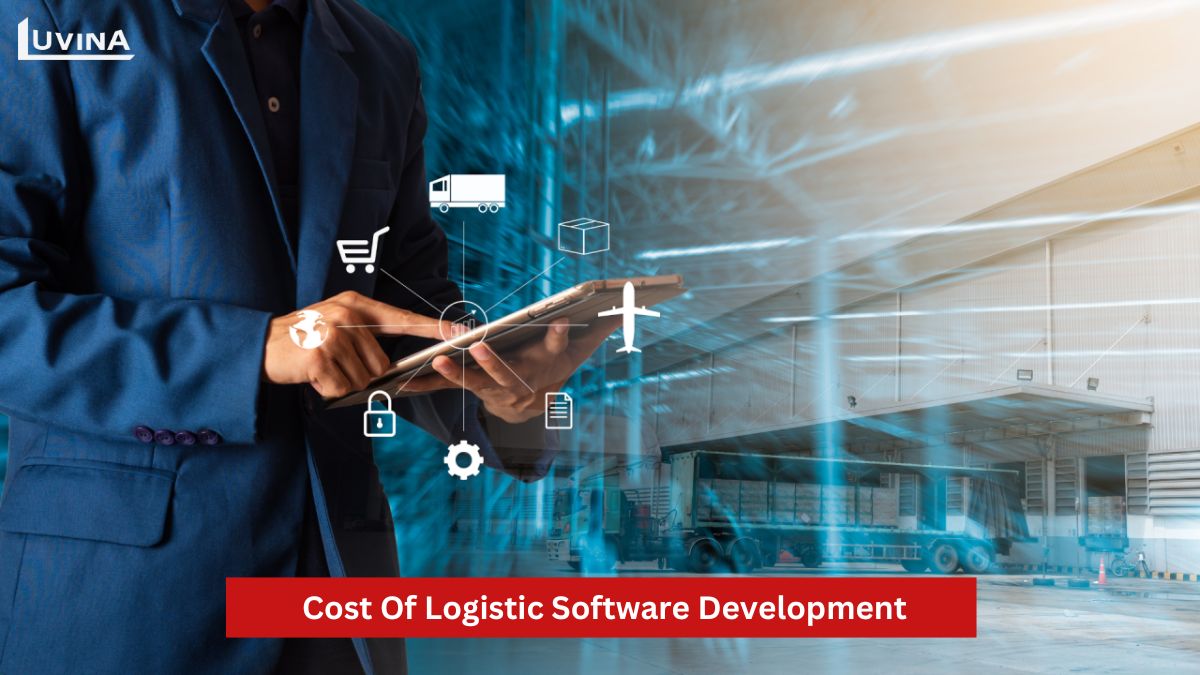
On the whole, the creation of the MVP for any logistics software may cost from $20,000 to over $100,000. Of course, it will depend on those factors set forth for every single project individually.
Final thoughts
Hope the article has provided you with precious and useful information to help you prepare thoroughly for custom logistic software development. To successfully develop logistics software, you need to take the time to analyze, plan, select the right technology stack, and choose a reliable partner who can help you create high-quality software.
If you have any questions about the logistics software development service, feel free to reach out to Luvina. With extensive experience and expertise in supporting businesses in the logistics sector, Luvina can greatly increase your chances of developing a successful and efficient application. From analyzing business ideas to development and post-release maintenance, Luvina is committed to delivering comprehensive solutions for logistics companies worldwide. Contact our experts to discuss your ideas!
Related Posts:









Read More From Us?
Sign up for our newsletter
Read More From Us?
Sign up for our newsletter